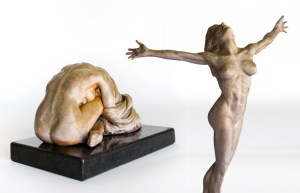 The constant seeking of the easy way out is the preamble for the disappointment of temporary fixes. The easy way out provides a clear picture of a character pattern that is very hard to change. It is often followed by frustration. With time, it also leads to lack of motivation, lack of engagement, and lack of commitment. The easy way out is only a way to temporarily contain a problem or a situation in order to regroup, think, and figure out a more permanent solution. After initial action is taken, if there is no follow up to seek a solution, the problem can become bigger.
The constant seeking of the easy way out is the preamble for the disappointment of temporary fixes. The easy way out provides a clear picture of a character pattern that is very hard to change. It is often followed by frustration. With time, it also leads to lack of motivation, lack of engagement, and lack of commitment. The easy way out is only a way to temporarily contain a problem or a situation in order to regroup, think, and figure out a more permanent solution. After initial action is taken, if there is no follow up to seek a solution, the problem can become bigger.
A few things come to mind when I think about temporary fixes and how easily we forget or ignore there is a problem until things explode in front of our faces. Bubble gum to cover a leaking pipe helps for a few minutes, but if the situation is not attended to in a timely manner, the mess is going to cost a lot. One of the most popular forms of temporary fix comes in the form of duck tape. We all know you can fix everything with duck tape without actually fixing it. How about coping skills?
Coping skills are a very import trace of character. They help you deal with stressful situations, but like bubble gum and duck tape these only work temporarily. How long can you hold on to a stressful situation before you can hold no more? How long can you breath in and breath out when facing a problem before you pass out? How many times do you have to count to ten before confronting and fixing the actual problem? Yes, coping skills are important and necessary, but we can only rely on them as tool that will help us regroup, think, and figure out a solution.
We all want to avoid difficult situations expecting for them to go away if we ignore them long enough. We are so accustomed to instant satisfaction that waiting for anything is not an option. That could be a reason why so many people live in constant frustration and disappointment. We can fall back to temporary fixes and never become satisfied with our existence. We can substitute living for just going with the flow. We can substitute loving and caring for good citizenship, and use emotional reactions when we need compassion and empathy. Those could help us long enough to ignore the situations and hope they just go away.
Hardship, difficult times, unexpected situations don’t come so we get distracted from our flow. These things are part of life and useful to develop character, self-control, awareness, mindfulness, and to connect with the world outside of our own little comfort zone. These situations come so we learn to respond instead of react. They help us see our flaws and strengths, and to live, not just exist. We can decide to ignore all these things and numb ourselves to death, and hope they don’t explode on our very faces. We can decide to confront situations and figure out a permanent solution, and, who knows, maybe we could learn something new about ourselves in the process.

Karen Keane
Dr Ivan Tirado